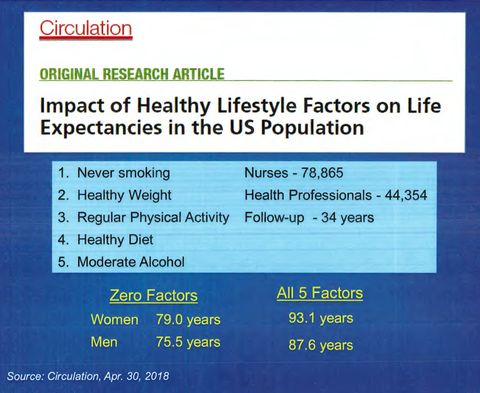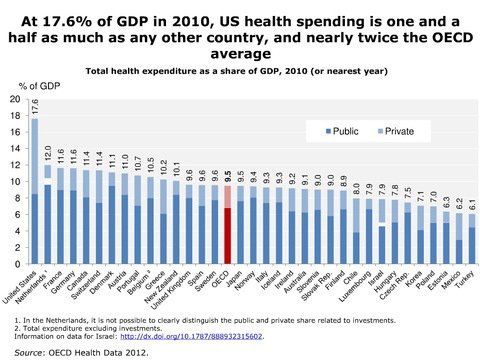PODCASTS/VIDEOS
BETTER HEALTH AT LOWER COST RADIO BROADCAST/PODCAST
Current news...
The UN World Health Organization on May 15, 2019 released the Following Risk Reduction Of Cognitive Decline and Dementia at the Royal Palace in Stockholm, Sweden.
The WHO Guidelines on Dementia, they will go a long way in informing the public on simple steps towards Better Health.
The WHO Guidelines on Dementia, they will go a long way in informing the public on simple steps towards Better Health.
Here’s the Press Release.
Please find more information on Preventing Alzheimer’s Disease below…
The life span in the United States for men is 87.6 years and for women 93.1 years according to research published in Circulation Magazine in April 2018 on 123,000 men and women over 34 years – see study. However, because men and women live unhealthy life styles including lack of physical activity, unhealthy diets, smoking and too much alcohol life expectancy for men is 75.5 years and for women is 79 years
By adopting unhealthy life styles, men and women , the cost of healthcare has increased dramatically as five chronic diseases that virtually didn’t exist 100 years ago have now become the biggest issues in healthcare – Azlheimer’s , Cancer, Obesity, Diabetes and Heart Disease. This is a self-inflicted wound that must stop.
The U.S. devotes far more of its economy — 17.6 percent of GDP in 2010 — to health than any other country. The Netherlands is the next highest, at 12 percent of GDP, and the average among OECD countries was almost half that of the U.S., at 9.5 percent of GDP.
Total health expenditures have increased substantially over the past several decades
Health spending totaled $74.6 billion in 1970. By 2000, health expenditures had reached about $1.4 trillion, and in 2017 the amount spent on health had more than doubled to $3.5 trillion. Total health expenditures represent the amount spent on healthcare and health-related activities (such as administration of insurance, health research, and public health), including expenditures from both public and private funds.
On a per capita basis, health spending has grown substantially
On a per capita basis, health spending has increased over 30-fold in the last four decades, from $355 per person in 1970 to $10,739 in 2017. In constant 2017 Dollars, the increase was almost 6-fold from $1,797 In 1970 to $10,739 in 2017.
Steps to Better Health At Lower Cost
Step 1 – Awareness.
The U.S. and other countries need to understand that healthcare costs are directly related to unhealthy living. The only solution to lowering healthcare costs is preventive medicine. In one study of 20,000 people over 20 years, the current cost of healthcare is 40 percent less and the incidence of Alzheimer’s is 38 percent less. Preventive medicine is the future of medicine.
Step 2 – The solution.
Adherence to 5 low-risk lifestyle-related factors(never smoking, a healthy weight, regular physical activity, a healthy diet, and moderate alcohol consumption)could prolong life expectancy at age 50 years by 14.0 and 12.2 years for female and male US adults compared with individuals who adopted zero low-risk lifestyle factors.
people that had all five of the good risk factors, the men lived 87.6 years and women 93.1 years.
We each must take responsibility for our own health. Our governments cannot bear this expense solely.
Stetson Family Office is sponsoring “Better Health at Lower Cost” series of broadcasts and podcasts on “Our American Stories with Lee Habeeb” so that we can all understand what the five chronic diseases are that are literally killing us earlier and are costing us money that the government cannot afford.
The Importance of Preventive Medicine
Preventive Medicine is the future of medicine because it addresses the chronic disease today - Alzheimer’s, Cancer, Diabetes, Obesity and Heat Disease - which are all phenomenas of the last 100 years in developed countries moving to developing countries and virtually non-existent in underdeveloped countries. Chronic diseases today are exploding our healthcare costs. We have no choice, but to get chronic diseases under control.
We need to get the word out globally that one third to up to one half of Alzheimer’s and one third to up to one half of Cancer is preventable or at least can be postponed. Diabetes, Obesity and Heart Disease can also be reduced. But we need to sound a wake-up call with the scientific evidence that exists.
Here
is a recent radio interview of Chuck Stetson, Stetson Family Office on the importance of Preventive Medicine.
We start with some background on the invention of preventive medicine.
The invention of preventative medicine
When President John F. Kennedy proposed in the early 1960s that Americans needed to get into better shape, there was a lot of interest. Yet, President Kennedy was only half right. Yes, Americans need - to exercise more to be healthier. But his proposed solution of calisthenics and muscle building – seeFit as a Fiddle- was wrong. Calisthenics and muscle building don’t really help.
U.S. life expectancy in 2017 was 76.1 for men and 81.1 for women, 26th and 29th respectively among the 35 developed nations.
But personal lifestyle choices – especially obesity and smoking, but also nutrition, risk-taking, exercise and sexual practices – all affect life expectancy. International differences in violence, urbanization, marriage and economic inequality also have an effect on averages.
The Global BMI Mortality Collaboration reports in The Lancet that overweight and obese populations have higher mortality, regardless of country. The U.S. has a substantially higher obesity rate than any other developed nation – again, a problem, but not one of inferior medical care. According to the Organization for Economic Cooperation and Development’s Health Statistics 2018, 40% of the U.S. population is obese compared with 17% in France, 13% in Sweden, 10.3% in Switzerland, 9.8% in Italy and 4.2% in Japan - the country with the longest life expectancy. Based on the estimated 6.5 years of lost life expectancy, obesity alone accounts for approximately 40% or more of the differences in life expectancy between the U.S. and almost every other country.”
But personal lifestyle choices – especially obesity and smoking, but also nutrition, risk-taking, exercise and sexual practices – all affect life expectancy. International differences in violence, urbanization, marriage and economic inequality also have an effect on averages.
The Global BMI Mortality Collaboration reports in The Lancet that overweight and obese populations have higher mortality, regardless of country. The U.S. has a substantially higher obesity rate than any other developed nation – again, a problem, but not one of inferior medical care. According to the Organization for Economic Cooperation and Development’s Health Statistics 2018, 40% of the U.S. population is obese compared with 17% in France, 13% in Sweden, 10.3% in Switzerland, 9.8% in Italy and 4.2% in Japan - the country with the longest life expectancy. Based on the estimated 6.5 years of lost life expectancy, obesity alone accounts for approximately 40% or more of the differences in life expectancy between the U.S. and almost every other country.”
The Man who Invented Aerobics
The person that figured out the answer to what was needed is Dr. Ken Cooper, medical doctor to the astronauts in the 1960s, who developed aerobics as a way of staying fit in space. Fifty years ago, Ken wrote the book “Aerobics” - introducing the word into the English language. At that time there were only 100,000 joggers. Fifteen years later, in the early 1980s, there were 34 million joggers. Ken Cooper, with some help from Jane Fonda’s exercise tapes, put physical fitness on the global agenda. In 1970, the government of Brazil asked Ken to train their football team (what Americans call soccer). He did and they won the World Cup that year. The Brazilians had no word for jogging so they adopted “making Cooper” in Portuguese as a way of translating the word jogging.
Preventing Alzheimer’s Disease
It is estimated at least one third, and perhaps as much as one half, of all the people that develop Alzheimer’s Disease could have avoided it. Alzheimer’s Disease costs Medicaid and Medicare about $288 billion each year for 5.4 million people and is expected to grow to $1.1 trillion each year for 15 million people in 2050 (excluding thes cost of home care and nursing homes). The numbers are truly staggering. It will bankrupt families and could even bankrupt governments. It has to come under control.
It is estimated at least one third, and perhaps as much as one half, of all the people that develop Alzheimer’s Disease could have avoided it. Alzheimer’s Disease costs Medicaid and Medicare about $288 billion each year for 5.4 million people and is expected to grow to $1.1 trillion each year for 15 million people in 2050 (excluding thes cost of home care and nursing homes). The numbers are truly staggering. It will bankrupt families and could even bankrupt governments. It has to come under control.
Here are some stories about what Alzheimer’s is and some things we can all do to prevent or at least postpone Alzheimer’s.
Meryl Comer - A Caregiver’s Account of Alzheimer’s.
A woman is like a teabag. You never know how strong she is until she's in hot water.
Meryl is President and CEO of Geoffrey Beene Foundation Alzheimer's Initiative, which promotes early diagnosis, virtual innovation challenges, m-health technologies and national public service campaigns. She is a Co-Founder of WomenAgainstAlzheimer's and Founding Partner of the Global Alliance on Women's Brain Health. Meryl is also Co-Principal Investigator for the PCORI Alzheimer's, Dementia, Patient & Caregiver Powered Research Network (funded by PCORI), a partnership of the Mayo Clinic, UCSF Brain Health Registry and UsAgainstAlzheimer's. She is a veteran broadcast journalist. Her New York Times
bestseller, Slow Dancing with a Stranger: Lost and Found in the Age of Alzheimer's
(HarperCollins) is an unflinching account of her husband’s early onset Alzheimer’s disease and a “much-needed wake-up call for an honest dialogue about this fatal neurodegenerative disease.” All of the proceeds support Alzheimer's research.
Alzheimer’s Webinar
Listen and watch why researchers believe that from a third to up to one half of
all Alzheimer’s can be postponed, reduced or avoided.
This global webinar, from early 2019, was sponsored by Alzheimer’s Disease International (ADI) and the Stetson Family Office.
Healthy Heart Means a Healthy Brain?
Dig deeper on the research
Cognitive impairment/dementia is the major and rapidly increasing human, social and economic burden globally. Prevention has been highlighted as the key element in managing the dementia epidemic. It has been estimated that at least 30% of Alzheimer’s Disease (the largest form of dementia) is related to conditions that can be influenced, including blood pressure, diabetes, obesity, physical activity, depression, and education (Kivipelto, Ngandu et al. Nature Reviews Neurology 2018)
Finnish Geriatric Intervention Study to Prevent Cognitive Impairment and Disability (FINGER) is a pioneering randomized clinical trial and the first in the world to show that a multidomain lifestyle-based 2-year intervention including diet, exercise, cognitive training and vascular and metabolic risk management can significantly reduce the risk of cognitive decline among at risk elderly persons from general population (Ngandu, Kivipelto et al, The Lancet, 2015, 385: 2255-63). No Alzheimer’s Disease drug trial has yet shown such an effect. The intervention was beneficial even in people with genetic susceptibility for dementia. It can improve health-related quality of life and reduce the risk of other chronic diseases (risk of multimorbidity was 60% lower). All these outcomes are crucial for healthy and active aging.”
Finnish Geriatric Intervention Study to Prevent Cognitive Impairment and Disability (FINGER) is a pioneering randomized clinical trial and the first in the world to show that a multidomain lifestyle-based 2-year intervention including diet, exercise, cognitive training and vascular and metabolic risk management can significantly reduce the risk of cognitive decline among at risk elderly persons from general population (Ngandu, Kivipelto et al, The Lancet, 2015, 385: 2255-63). No Alzheimer’s Disease drug trial has yet shown such an effect. The intervention was beneficial even in people with genetic susceptibility for dementia. It can improve health-related quality of life and reduce the risk of other chronic diseases (risk of multimorbidity was 60% lower). All these outcomes are crucial for healthy and active aging.”
FINGER has caused a paradigm shift, i.e. cognitive decline is no longer an inevitable consequence of aging, but can be prevented with multidomain interventions. The study has resulted in a large global interest in follow-up and expansion of the initial FINGER study. Professor Kivipelto and her team have now launched and are leading the global effort called World-Wide FINGER (www.alz.org/wwfingers), a unique interdisciplinary network to share experience, harmonize data, and plan joint international initiatives for the prevention of cognitive impairment/dementia. Researchers from 15 countries around the world are already carrying out or are about to start a number of clinical trials based on the FINGER protocol.
Are there ways to keep your brain healthy?
Hear Todd Stump's story and what it was like to care for his mother with Alzheimer's.
Dig deeper on the research
- Two Lancet Commission articles from December 2017 confirming that 1/3 of the population can reduce the incidence of Alzheimer's Disease through cardiovascular exercise. (Dementia and Prevention)
- The research on the 20,000 Cooper Clinic patients that had 38 percent less incidence of Alzheimer's Disease
- The FINGER study in Finland, the gold standard worldwide in determining the impact of cardiovascular, nutrition and cognitive training in reducing cognitive decline.
Ken Cooper, M.D. and the doctors at the Cooper Clinic in Dallas, Texas meet with each patient over 40 years old and give them the one-pager below on how to avoid Alzheimer’s Disease and dementia.
Preventing Cancer
According to M.D. Anderson Cancer Center, one third to one half in aggregate of all the 100 or so identified cancers are preventable. This series tells stories of people that were able to prevent cancer by early detection.
According to M.D. Anderson Cancer Center, one third to one half in aggregate of all the 100 or so identified cancers are preventable. This series tells stories of people that were able to prevent cancer by early detection.
He Couldn't Have Known...That His Investment Would Save His Mother-In-Law's Life
Diabetes
Dig deeper on the research
Preventing Obesity
There are several approaches to preventing obesity. One has to first discover what is the problem. Is it a lack of knowledge? The Health Zone School Program deals with the issue of knowledge. Is there something deeper? One of the issues the Obesity Clinic of Kaiser Permanente Hospital in San Diego found is that abused children eat a lot of comfort food and become obese. They know that they should eat a better diet. However, the need for comfort overrides this.
There are several approaches to preventing obesity. One has to first discover what is the problem. Is it a lack of knowledge? The Health Zone School Program deals with the issue of knowledge. Is there something deeper? One of the issues the Obesity Clinic of Kaiser Permanente Hospital in San Diego found is that abused children eat a lot of comfort food and become obese. They know that they should eat a better diet. However, the need for comfort overrides this.
How Young People Can Get Better Grades and Avoid Obesity Through Exercise.
Preventing Heart Disease
Dig deeper on the research
- Association of Midlife Cardiorespiratory Fitness with incident depression and cardiovasular death after depression in later life.
- Cooper Institute Study: Low level of fitness has increased risk of depression
- Association Between Push-up Exercise Capacity and Future Cardiovascular Events Among Active Adult Men



